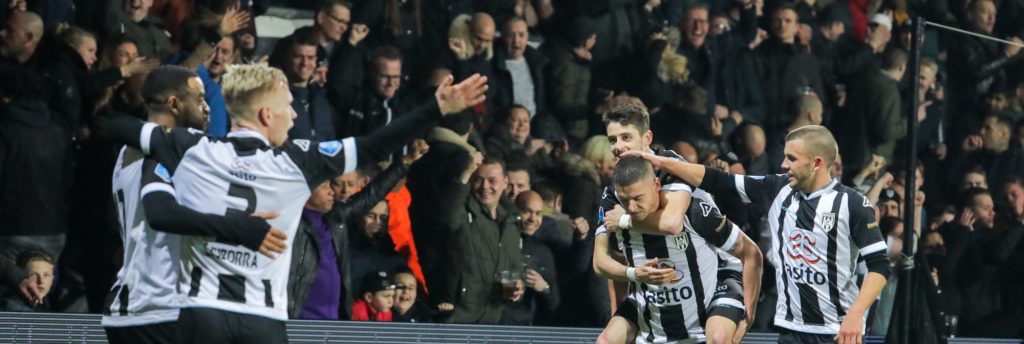" It could have been double figures after that, as wave after wave of attacks rained down on Venlo’s back-four. It somehow stayed at 1-0 until half-time, after which the relentless creation of chances began to turn into goals and they eventually won 4-1. It could, on another day, have been 14-1 "

You Only Win When You're Singing

Darren Young
@fanexperienceco
Darren has a weekly column on the D3D4 Football website. He is responsible for The Fan Experience Company reports that in 2019/20, went to over 200 clubs in 13 countries.
The football authorities have a serious decision to make when it comes to COVID-19. Most associations, leagues, clubs (except West Ham), managers and players want the current campaigns to be completed, but with restrictions and social distancing measures unlikely to do anything but get stricter in the coming weeks and maybe months, the resumption of professional football is still a way off.
While the postponement of Euro 2020 provides some room, there is still the issue of next season because starting that late – or too late – means that unless the seasons are shortened in some way, and with Euro 2020 (now Euro 2021) in the summer, then we will have even more congestion and problems to deal with in just over a year’s time. So, the inevitable question has come up. Should we continue – when / if permissible – behind closed doors? As in, with no fans?
Mini-tournaments in one city have been suggested as ways to complete UEFA competitions, while this weekend there has been talk of league games being played in one ‘isolated’ place – I can’t stop imagining a sports hall that’s been declared a Corona-free-zone with basketball and badminton lines marked out too and those goals that move back a few inches when a hard shot hits them. In my head there is also the screeching of trainers too and the shouting of the players echoes around well after it’s left their mouths.
But whatever it looks like, no fans present is becoming an increasingly likely outcome. Not a satisfactory one, of course, but maybe a necessity on this occasion. As gate money plays less of a role in Premier League revenue streams, you can see an appeal – especially as the TV channels would be all over it and they could probably afford to put a new surface down.
But for League One, Two and National League clubs, the loss of gate receipts for a few thousand fans over a few games make it less satisfactory; a last resort maybe but not a choice they want to make.
It’s easy to focus on Liverpool and their fans as they are at the pinnacle of the English game and the current world champions. Having waited so long for that elusive Premier League title, winning it in an empty stadium (or worse still, sports hall) would be anti-climactic to say the least for the players, but much more so for their supporters. But dozens of clubs are in a similar situaiton.
This also raises a wider question of what part fans play, or should play, in football.
Obviously, it’s not really football without them. Pep says there is no point if they aren’t there and I get that. But I mean the more nuanced aspect of fans – how important are they to the way their team plays? For me, it was a question that came up several times during lots of travelling across Europe as part of the work I do for The Fan Experience Company.
I found that I was in stadiums, for up to an hour before kick-off, and they were mostly full – the sections behind the goals certainly were – and very noisy. The fans can be generalised as excited, expectant and, visibly, extremely positive. In other words, very un-British-like, where the typical norm is for everyone to show up a few minutes before the start and take a while to warm up.
This other way was demonstrated nowhere better than in the town of Almelo, situated near the mid-Eastern border of The Netherlands, where the team, Heracles, who sat just over half-way up the Dutch Eredivisie when the league was suspended, play. This is about right. They finished seventh last season (when I last watched them) and aren’t a team that are ever going to trouble the ‘Big 3’ when it comes to honours; they’ve won the league twice in their 117-year existence, the last time during World War II. So, their fans are not used to success – not in terms of silverware anyway.
When I went to their tidy Erve Asito stadion (capacity 13,500), on a miserable grey and cold Sunday lunchtime, I was immediately drawn to the place. The people (staff and fans) were friendly and welcoming, the stadium itself was homely and neatly decorated in club colours (black and white) and they had a spectacular curry sauce that they put on their burgers.
But what struck me most was the atmosphere. Fans – old, middle-aged and young – all seemed to be in the same mindset. There was a lovely song – that, as far as I could tell, was about pride in the town itself rather than attributed solely to the club – that almost everyone sang. Then streamers were fired into the air around their 4G pitch as the teams arrived, kids waved flags on the pitch and they had those giant inflatable figures in the club strip too. The noise levels never went down. There was a raucous hum as the players went through their pre-match rituals while the PA system pumped music that got both louder and more tub-thumping by the minute and thus really lifting the noise and excitement levels.
By the time the whistle went the atmosphere was incredible. There were only about 10,000 people inside but it felt like a lot more. Singing came from everywhere – not just the obvious places like the banks of ultras behind the goal – but it wasn’t just about songs. There was this almost tangible positive energy, almost like a black and white mist coming down from the stands and onto the field; making the home team’s players look an inch taller and move a yard quicker.
The visitors, VVV-Venlo, didn’t know what had hit them. From the kick-off, Heracles attacked down the flanks, and had an early shot that the keeper did well to save. A minute later another shot was cleared off the line with the goalie beaten. Thirty-seconds after that, a corner was forced and before three minutes were up on the clock, the pressure told and the home team scored.
It could have been double figures after that, as wave after wave of attacks rained down on Venlo’s back-four. It somehow stayed at 1-0 until half-time, after which the relentless creation of chances began to turn into goals and they eventually won 4-1. It could, on another day, have been 14-1.
So, would – or could – that have happened without the crowd’s input? If that game were, say, played next month and behind closed doors, would the home team be able to muster that same intensity? Would the away team have been quite so overwhelmed and intimidated? I thought at the time that it wasn’t possible and nothing I’ve seen since has changed that view.
Of course, it could have still happened. The score line anyway. The home team could also have been on top early on, but it’s hard to imagine they would have had their foot quite so hard on their opponent’s throat without the crowd willing them on.
But, of course, it was just one game. Teams can win (and lose) 4-1 in any circumstances, so the evidence is anecdotal and totally unreliable. I did, however, check the results for Heracles for the whole season and it was an interesting read.
Their home record went like this – W W W W W L W L L W W L W L W W L
Two of the 6 defeats (the first two) were against PSV and Feyenoord, although they did beat champions, Ajax. A further two defeats, the final two, still saw them score 7 goals but lose high-scoring games (3-4, 4-5). Only the big three clubs achieved more home wins, as they always do given their dominance at the top of the division. Away from home it was a completely different story; Heracles were average at best.
Still far from scientific though. The early goal at home was a fairly typical occurrence, however. In half of their home victories, the opening goal was scored before the seventh minute while they scored in the first 30 minutes in all but three games.
I compared this to another game I attended that season, this time in the EFL, where the [remain nameless] home team were greeted onto the field to booing by a large contingent of the home ‘support’, causing me to wince. I’ve seen indifference a few times, but fans are generally positive the world over when their team takes to the field at the beginning. Within twenty minutes they were two down. Coincidence?
Even in the Eredivisie there was a match that showed a different side. At a game in Doetinchem, just east of Arnhem and again, close to the German border, the home team (De Graafschap) began the match with incessant pressure (this time, coincidentally, Heracles were the visitors) spurred on by fantastic support from the home crowd. They were in the relegation zone but you’d not know it – they played more like Brazil – as three speedy forwards wreaked havoc. The home crowd, similar to that at Heracles in the way they had noisily got behind their team from well before kick-off, were incredible and much louder than 12,500 people had any right to be. Their team could have scored three or four, but still got an early goal (16 minutes) and were well on top.
But something changed. The crowd were noticeably quieter in the second-half and the momentum shifted. Maybe it was anxiety at the close score line, a lack of belief that they could hang on, or maybe they just had too much beer and food at half-time, but they didn’t reach the octave levels seen in the first half, and the team never reached the same levels either, conceding two quick-fire goals after the hour that left the ‘Pond Hill’ stadium in near silence as the team suffered a 1-2 defeat.
So, which is it? Do the fans lift the team to better performances or do the team have to perform first to get the fans behind them?
The, albeit low number of, examples from The Netherlands suggest the former and I saw plenty of other times that this happened in games across several countries. But in England, (mainly, but it happened to an extent with the big three in the Eredivisie) I see a lot of games at clubs where the fans need something to get excited about before they begin to show any passion.
My own team had one match last season where the atmosphere was generally considered the best it had been for a long time, but it took a controversial sending off of our top scorer in the sixth minute to get the crowd going, and more significantly off the player’s backs and onto that of the referee for this to happen. And you can’t manufacture that scenario every home game either.
So what role does form and results play in all of this. There is an assumption that if the team is winning (and thus ‘in form’), then fans will automatically be more likely to attend and make more noise. But that’s not always borne out in facts. For example, as Jonathan Wilson explains in Inverting The Pyramid, when Sven Goran Eriksen was appointed at IFK Gothenburg of Sweden in 1979, he ‘made them harder to beat, and also harder to watch’. They became more successful again, but their home attendances fell by an average of 3,000 as they did so.
Heracles don’t win leagues very often. Yet their ground was pretty much full for a game against non-fashionable opposition. De Graafschap eventually got relegated but their stadium was full that night and the other relegated team (NAC Breda) that season also had consistently high numbers.
So what does all this mean? It needs a lot more research of course, to define any long-term patterns but there has to be some correlation between the way the fans get behind the team and the results out on the pitch, doesn’t there?
Do fans sing more because they are winning, or do the team win because of their singing? Or do the two go hand in hand? Does the initial singing make the team play better, making the fans even louder and supportive? And if there is a link, why don’t fans in England do this more often, and why aren’t clubs finding ways to encourage them too?
My theory is that you sometimes don’t know what you’ve got till it’s gone. And even clubs with relatively small attendances might realise that the noise created goes a long way to helping them, and that if it were even louder, it would have an even more positive effect. If we had empty stadiums, this would be an incredible leveller, in my opinion, and a lot of home teams will find it much harder to make that advantage count.
Unfortunately, in a few weeks’ time I suspect we’ll find out if that’s the case.
Unless it’s in that sports hall, of course.
Originally published 31.03.20 on D3D4 Football
© The Fan Experience Company 2020
